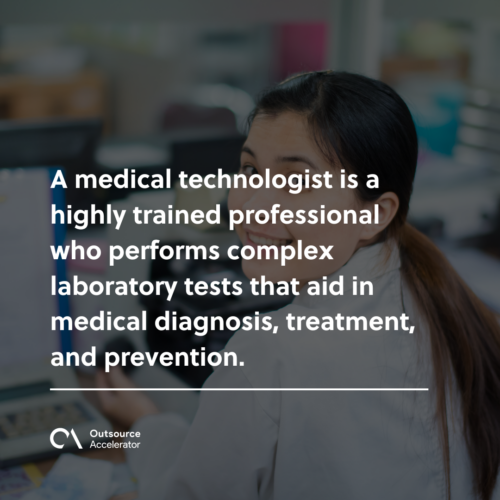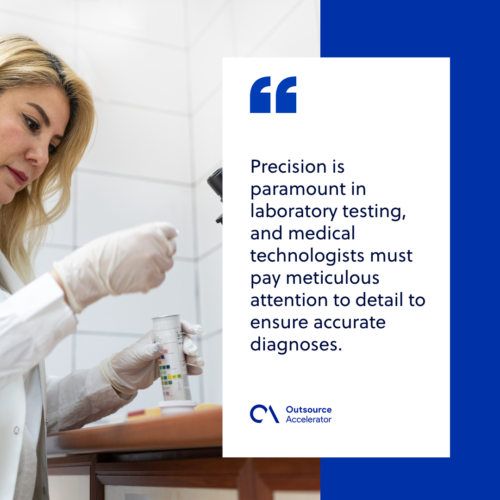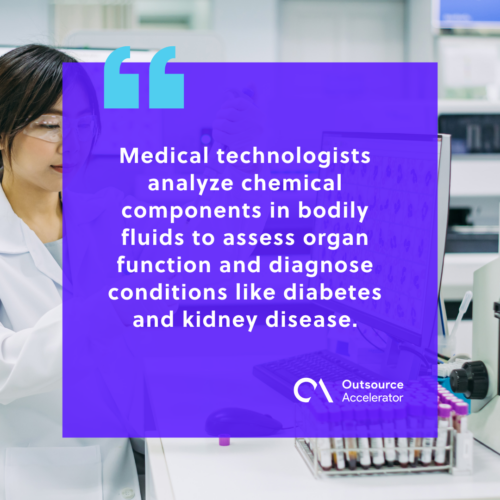The vital role of a medical technologist in healthcare

Behind the scenes of every healthcare facility, a crucial player operates – the medical technologist. Medical technologists, often unsung heroes, are vital in ensuring accurate diagnoses and effective patient care.
Let’s unveil the significance, responsibilities, subspecialties, and essential qualities that make medical technologists indispensable in the world of healthcare.
What is a medical technologist?
A medical technologist is a highly trained professional who performs complex laboratory tests that aid in medical diagnosis, treatment, and prevention.
Medical technologists focus on collecting and analyzing body fluids and tissue samples.
Their work provides crucial information to physicians, enabling them to make informed decisions about patient care.

Medical technologists are also referred to as:
- Clinical laboratory scientists
- Clinical laboratory technicians
- Medical laboratory scientists
- Medical laboratory technologists
- Clinical laboratory technologists
Medical technologist vs. Lab technician
Before diving into the specific responsibilities of a medical technologist, it’s important to distinguish them from a lab technician.
Lab technicians typically require a lower level of education, such as a certificate or an associate’s degree. They focus on performing routine tests under the supervision of medical technologists or laboratory scientists.
Medical technologists, on the other hand, have more specialized training and education. They usually have a bachelor’s degree in medical technology or a related field.
A medical technologist is also involved in more intricate testing procedures. This is because they often have a deeper understanding of the scientific principles behind the tests they conduct.
Required skills, education, and training for a medical technologist
Medical technologists are equipped with a blend of technical skills, education, and training that make them adept in their roles.
Here are some of the requirements necessary to identify a good medical technologist:
Education and training
A certified medical technologist has the following education and training background:
- A bachelor’s degree in medical laboratory science or a related field is typically required to enter this profession.
- They must have a strong foundation in science and mathematics.
- A medical technologist must complete a certified program approved by the National Accrediting Agency for Clinical Laboratory Sciences (NAACLS).
- Once they have completed education and training requirements, they must get certified. This depends on the location, as some places require licensing for medical lab personnel.
Skills
A reliable medical technologist must possess the following capabilities:
- Medical technologists must have sharp analytical skills to interpret complex test results accurately.
- Precision is paramount in laboratory testing, and medical technologists must pay meticulous attention to detail to ensure accurate diagnoses.
- Proficiency in laboratory techniques and equipment operation is essential for conducting tests effectively.
- A medical technologist must know how to communicate effectively when relaying results to healthcare professionals.

To become a successful medical technologist in medical laboratory technology or clinical laboratory science, one must combine essential skills, proper education, and specialized training.
Responsibilities of a medical technologist
Medical technologists conduct a wide range of laboratory tests and analyses to provide accurate and timely information to healthcare professionals.
They work in various laboratory settings, mainly:
Clinical pathology
In the field of clinical pathology, a medical technologist tests body fluids to analyze chemical components, cell counts, and other indicators.
These tests are crucial in diagnosing and monitoring diseases, disorders, and infections.
The following are the types of specimens medical technologists can look at:
- Blood
- Urine
- Sputum
- Stool
- Spinal fluid
- Pleural fluid
- Peritoneal fluid
- Joint fluid
- Bone marrow
Anatomical pathology
Anatomical pathology is a crucial field within medical and diagnostic laboratories, where medical laboratory scientists play a vital role in examining tissues and organs to diagnose diseases.
Medical technologists in this field prepare tissue sections, stain them, and assist pathologists in examining the samples.
This helps identify abnormal tissue patterns, detect cancerous cells, and assess disease progression.
Medical examinations that a medical technologist can conduct or help with include:
- Gross examination
- Histology
- Cytopathology
- Electron microscopy
- Cytogenetics
Subspecialties of a medical technologist
A medical technologist can specialize in specific areas of laboratory testing. Some of their key subspecialties include:
- Clinical chemistry. Medical technologists analyze chemical components in bodily fluids to assess organ function and diagnose conditions like diabetes and kidney disease.
- Hematology. Specializing in blood-related conditions, medical technologists analyze blood samples to diagnose anemia, leukemia, and clotting disorders.
- Immunohematology (blood banking). Medical technologists in this field ensure the safe and compatible transfusion of blood products. This is crucial for surgeries, trauma care, and chronic blood disorders.
- Microbiology. Microbiology technologists identify and study microorganisms that cause infections. They can aid in the selection of appropriate antibiotics for treatment.

Importance of medical technologists in healthcare
Medical technologists play a vital role in the healthcare system, supporting the diagnosis, treatment, and management of various medical conditions.
Their precise and reliable laboratory tests provide crucial information that guides medical decisions.
For instance, accurate blood test results let physicians monitor medication effectiveness, identify organ dysfunction, and detect signs of infection.
As a trained professional, also known as a medical laboratory scientist or clinical laboratory technologist, this specialist has the knowledge and skills to perform intricate laboratory tests, analyze results, and contribute valuable data for patient care.
Furthermore, a medical technologist contributes to patient safety and overall healthcare quality.
Their work ensures the compatibility and safety of blood transfusions and helps prevent adverse reactions and complications in patients undergoing transfusions.
In a world grappling with the COVID-19 pandemic, medical technologists have been at the forefront of diagnostic testing. They have been pivotal in analyzing samples, detecting the presence of the virus, and helping to track its spread.
Their expertise and dedication have been instrumental in controlling the pandemic and saving lives.







 Independent
Independent




